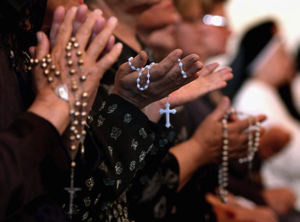Repent, for the kingdom of heaven is close at hand. (Matthew 3:2)
 It would be foolish, I think, for anyone to suppose that religion is less important in human society today than it was in the past. I’ll admit the place of the priest in the local community or the Bishop in Society is not what it might have been. The respect and deference which many of us may remember as children is certainly much less than it ever was.
It would be foolish, I think, for anyone to suppose that religion is less important in human society today than it was in the past. I’ll admit the place of the priest in the local community or the Bishop in Society is not what it might have been. The respect and deference which many of us may remember as children is certainly much less than it ever was.
Yet when we watch the news and consider attitudes it is certainly not the case that religion has gone away and crawled under a stone. Look at the tremendous interest in everything Pope Francis says, and the way people look for hints of changes ion direction and emphasis. Consider the interest placed in England in the words of the Archbishop of Canterbury when he speaks about the economy. And also notice - and this is especially interesting - the voices against religion, those who campaign against the ever popular faith schools, or who complain that religion is the sources of all ills. Be sure of this - while you’ve got critics and enemies then you are still a force to be reckoned with.
And notice too - though this is not always a good thing - the important role which religion plays in local and global conflicts - not necessarily the cause, to be sure, but certainly an important factor in war and peace, in poverty and international aid, in the building and staffing of hospitals and schools, in the eradication of ignorance and disease.
And yet, there is more difficult aspect to the role of faith in our society, especially in Europe, particularly in Britain.
There will be many, including those who don’t believe, who will allow that religion is important - important to know about - important to understand people’s beliefs and motivations - but not important to follow or embrace. In this very enlightened and positive attitude to religion the keywords are respect, and understanding - not Faith, or commitment.
And let’s be honest about this, because it is an approach to the issue which probably affects most of us too - we tend to see religion now as about individual choice and preference, rather than community identify: people see the good aspects of religion to be not about truth or eternal values, but more as a matter of comfort and culture. It’s positive power is in its ability to soothe, and encourage, and pacify - rather than as a call to conversion to change, to commitment, to salvation.
We see it in areas of public life too. In our prisons and our justice system, Religion - and especially Christianity is now no longer about reform and repentance, it is instead about supporting and comforting those in distress. It is not about challenging behaviour anymore, but about caring for those in trouble. It is no longer about values, but has become a support service, like education, or dentistry.
And we see it nowadays in the hospitals too. The sick have a right to ask for their chaplain to visit them - but the chaplain has no right to seek out those who have not asked … or who didn’t realise they had to ask.
And this attitude infects our relationships with other Christians and other faiths and those of none. “That’s your opinion” people are likely to say. You have a right to practice your faith … but no right to persuade others that they should follow it too. It leads to some of the ludicrous examples we come across from time to time - like the resistance of public bodies and state schools to have Christmas Cribs and Nativity Plays. And it leads also to an idea that when we talk about God’s love, and God’s love for everyone, it is taken to mean that God blesses us wherever, whenever and whatever we do.
Now, of course, faith is about comfort. And it is welcome, I am sure, that we nowadays concentrate more on praising God than being paralysed by the fear of offending him. And people should be protected, especially when most vulnerable, from harassment and emotional pressure. It is certainly good that different faiths and none can enjoy mutual respect and not fear persecution.
But it is a very sorry day when we forget that the first instruction of Jesus to those who followed him was “Repent”, Change, Commit. And the second instruction he gave was that we should be fishers of men, calling others to join us, to follow the same path. It is regrettable when we suppose God’s love for the sinner means that he does not want the sinner to change. It is unfortunate when we speak only of heaven, but never of purgatory and still less of hell. It is sad when the message of the Gospel is stripped of its challenge, and faith - which is always a source of comfort - never becomes anything more.
